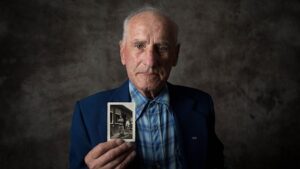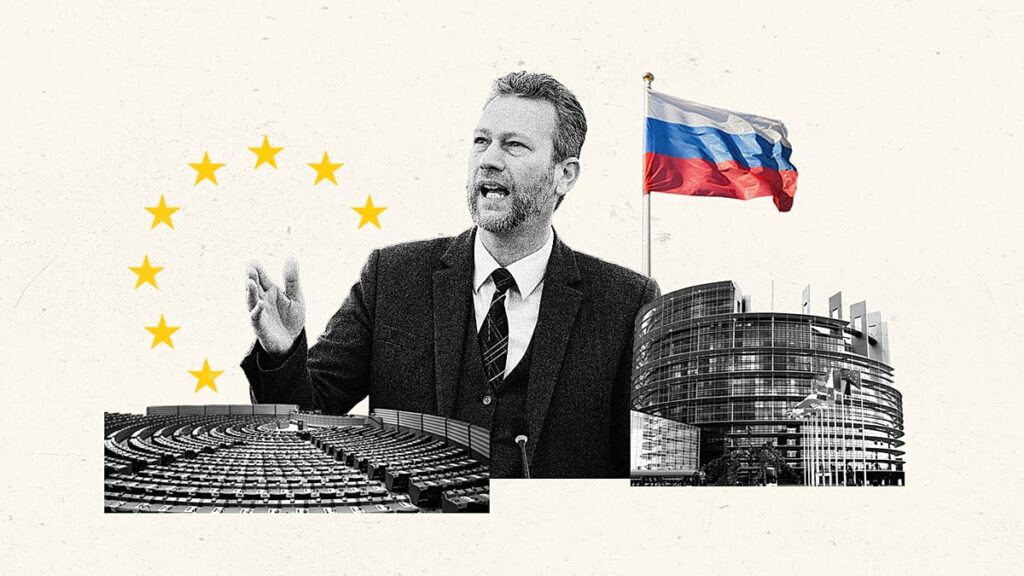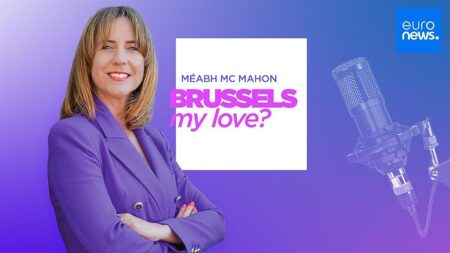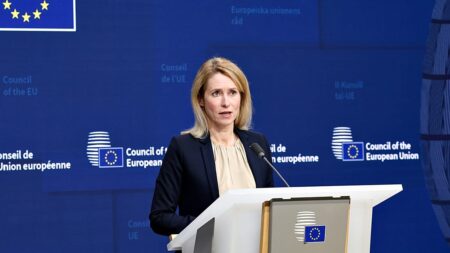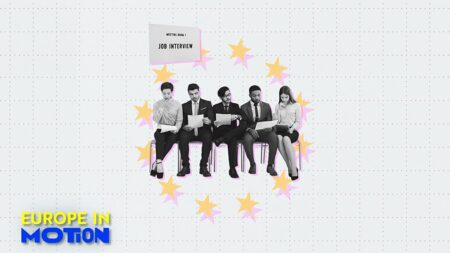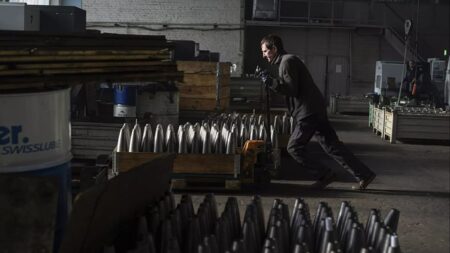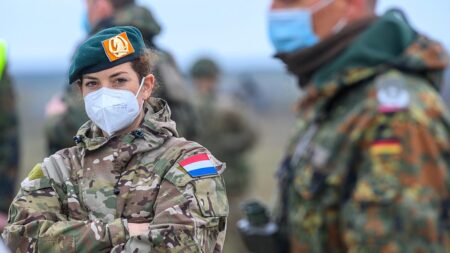A former Member of the European Parliament (MEP) has been sentenced to ten and a half years in prison by a London court as part of a bribery case that has raised questions about how pro-Russian influence networks have targeted European lawmakers.
Nathan Gill, a former Mormon bishop and father of seven who was an MEP for UKIP and The Brexit Party between 2014 and 2020, pleaded guilty to taking bribes in exchange for Russia-friendly parliamentary interventions during his time in office.
UK counter-terrorism police said he accepted payments to “peddle narratives that would have had the effect of being beneficial towards Russian interests”, including through events, speeches, media appearances, and contact with senior EU officials.
The London court heard on Monday that the bribes were paid by Oleg Voloshyn, a former pro-Russian Ukrainian MP, but that the broader operation was directed by Russian President Vladimir Putin’s right hand man in Ukraine, oligarch Viktor Medvechuk, who was the principal “source of money” in the scheme.
Gill’s sentencing comes a week after at least six MEPs and five members of national European parliaments attended a forum in the Russian Black Sea city of Sochi at which Voloshyn was also present.
In 2018 and 2019, Gill recited speeches scripted by Voloshyn in the European Parliament’s Strasbourg hemicycle, defending two of Medvechuk’s media companies that were later banned by the Ukrainian government.
He also arranged an event in the European Parliament where Medvedchuk presented his “peace plan for Donbas”, the Ukrainian regions that were at that time partly occupied by Russia following its 2014 invasion.
Gill and Voloshyn also discussed “enlisting the support of several MEPs”.
Three other MEPs who served at the same time as Gill, speaking to Euronews on condition of anonymity, said they had little or no recollection of him. One, who served on a parliamentary committee with Gill, noted his towering height (193cm), but said that apart from that, they could “hardly recall” him.
“If he took part in committee deliberations or meetings, he was no shining star, but a low profile, rarely attending meetings or discussions,” the former MEP said.
His crimes took place between the 2016 Brexit referendum and the final withdrawal of the UK’s MEPs under the Brexit agreement in January 2020.
The architect of the scheme, Medvechuk, is also known to have continued to operate a bogus media outlet called Voice of Europe – now sanctioned and the subject of a separate investigation by authorities in Belgium – suspected of having paid MEPs to peddle propaganda far beyond the time of Gill’s crime, as recently as 2023.
Voloshyn at Sochi event attended by MEPs
Anton Shekhovtsov, a visiting professor at Austria’s Central European University who researches European politicians’ ties to Russia, told Euronews that Gill’s crimes could be the tip of the iceberg in a broader web of influence operations.
“I presume Gill is not the only politician who took bribes, but he is the one who got caught. He was not particularly clever as he kept all those communications on his WhatsApp for years,” Shekhovtsov said.
Gill’s statements and media appearances preceded Russia’s 2022 full-scale invasion of Ukraine, likely making it easier for him to fly under the radar.
Despite this, three years into the conflict, a string of MEPs and parliamentarians are still cosying up to Moscow, despite the EU’s sweeping sanctions and a raging war, with some travelling to the second edition of the “BRICS-Europe” conference in Sochi on 14-15 November.
In Germany, news that far-right Alternative für Deutschland (AfD) politicians had participated in the conference drew anger across the political spectrum, and inflamed an internal division in the party over its stance on Russia.
Addressing the Sochi controversy, the party’s co-leader Alice Weidel told reporters she did not understand what her party was “supposed to be doing there [in Sochi].”
Her statements contradicted those of her party co-chairman, Tino Chrupalla, who has maintained that Russia does not pose a threat to Germany.
Defending the AfD politicians travelling to Sochi, he said: “The colleagues who are going there have registered for their trip. It has been approved.”
Also in Sochi were a delegation of politicians from Bulgaria’s far-right pro-Russian Revival party, Vazrazhdane, with MEP Rada Laykova sharing photos of the event.
In one image she posted on Facebook, the chairman of the party, Kostadin Kostadinov, is pictured conversing with Voloshyn.
The Sochi summit has raised concerns in Brussels and European capitals about the nature of discussions held behind closed doors, as well as the political positions of MEPs who attended the event.
On 18 November, three days after the summit, Luxembourg MEP Fernand Kartheiser urged the EU to “engage without further delay in a dialogue with Russia” in a letter addressed to the EU’s foreign policy chief Kaja Kallas, which was obtained by Euronews.
That day, Russian state-controlled news agency TASS shared the letter, which peddled Kremlin talking points in the form of an eight-point plan outlining “possible ways to help achieve a sustainable resolution to the conflict in and around Ukraine”.
Kartheiser – who was expelled from the European Conservatives and Reformists (ECR) group in June due to his ties with Russia – urged Kallas to include his proposals in the agenda of the next Foreign Affairs Committee Meeting, in a bid to allegedly move “a sterile and dangerous confrontation to a stable and just peace.”
Media operations as propaganda fronts
Voloshyn specifically paid Gill to defend Channel 112 Ukraine and NewsOne, the Medvechuk-controlled channels banned by the Ukrainian government in 2021.
In the speeches Gill was bribed to deliver in the Strasbourg hemicycle, he described 112 Ukraine and News One as being under “undue pressure” from the Ukrainian government, and accused President Volodymyr Zelenskyy of ”stripping TV stations of their licences” and “threatening those he does not like”.
Gill’s declarations of interests to the European Parliament also show that he sat on the “international editorial board” of Channel 112 Ukraine along with fellow UKIP and Brexit Party MEP David Coburn.
Anton Shekhovtsov told Euronews that the channels were “straightforwardly pro-Russian” and were banned when they became “intolerable” propaganda outlets.
“Viktor Medvechuk decided that he would try to protect his media project with the help of European politicians, and through people who worked with him (…) he reached out to European politicians,” Shekhovtsov explained.
He added that the “drama” and “theatre” of European lawmakers peddling Kremlin narratives against the backdrop of EU flags “worked for some audiences” and would be peddled across pro-Russian media outlets.
Gill and other MEPs were photographed in an interview with Channel 112 Ukraine, anchored by Voloshyn’s wife Nadia Borodi, also known as Nadia Sass, in the European Parliament in Strasbourg in 2019. Records from the European Parliament show Sass also organised Gill’s travel to Ukraine.
Sass also appears in a now-infamous selfie taken outside the parliament with Nigel Farage, now the leader of the Reform UK party, who then served along with Gill in the European Parliament. Gill later went on to serve as Reform UK’s leader in Wales.
The court heard on Monday Voloshyn had asked Gill to attract other MEPs to make media appearances, offering Gill “another 4K for it.”
Another channel: Voice of Europe
Medvechuk – who was detained by Ukraine in April 2022 following the launch of Russia’s invasion and later released to Russia as part of a prisoner exchange – did not terminate his media operations with the banning of his channels in Ukraine.
Medvechuk went on to operate through a Czech-registered company known as Voice of Europe as a means of evading sweeping EU sanctions on Russian media. In 2024, Medvechuk was sanctioned for his financing of Voice of Europe, first by the Czech Republic and then by the EU.
Voice of Europe is still the focus of an ongoing investigation by authorities in Belgium, and is suspected of having paid other MEPs to spread pro-Russian propaganda.#
At least a dozen MEPs were interviewed by the outlet in the run-up to last year’s European elections, but there is no evidence that they were paid for their appearances.
Several former MEPs embroiled in the Voice of Europe scandal, including AfD’s Maximilan Krah, have been linked to the ongoing Belgian investigation. Krah has denied he was paid for his appearances on the outlet despite police raids last year on his office and one of his staffers’ homes.
Another MEP, Denmark’s Anders Vistisen, told Euronews in an interview last year that he was not paid to speak to Voice of Europe.
The European Parliament confirmed last year it was “looking into” allegations its then-members were paid to speak to the outlet.
Euronews asked the Belgian federal prosecutor whether the investigation into Voice of Europe had progressed, but did not receive comments in time for the publication of this article.
In a statement shared with Euronews, the European Parliament said it “takes note of the ruling and relevant services will further analyse it.”
Read the full article here



